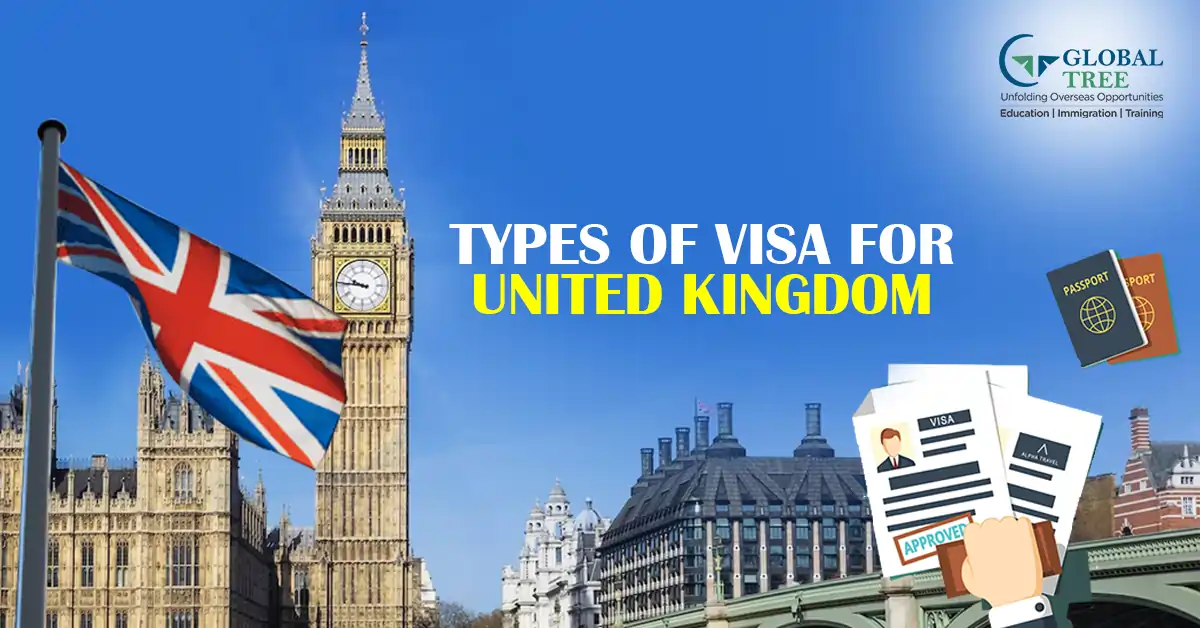All Types of Visa for UK: A Visual Guide to All Your Options

- Introduction
- Who Needs a UK Visa?
- UK Visa Types
- UK Residence Permits
- How to Apply for a UK Visa?
- When Should I Apply for a UK Visa?
- What are the Required Documents for UK Visa?
- What is the Points-Based System (PBS)?
- Electronic Visa Waiver
- How to apply for Electronic Visa Waiver?
- What a UK Visa holder must know?
- How Long Does it Take to Get a Visa for the UK?
- What is the Immigration Health Surcharge?
- What Are the Reasons for UK Visa Denial?
- What Can I Do In Case of Visa Denial?
- Can I Get a UK Visa If I Have a Criminal Record?
- Do I Need to Register With the Police?
- Can I Travel Abroad While I Am in the UK With a Valid Visa?
Introduction
A UK visa serves as an official document that grants individuals from around the world the privilege to enter the United Kingdom, whether for a temporary stay or permanent residency. Typically, a visa is a mark or endorsement placed in your passport or a formal document issued by a UK consulate or embassy in your country of residence.
When you are granted a visa, it signifies that you are qualified to enter the UK and that you meet the specific requirements associated with the particular visa category you have been granted. People seek UK visas for various reasons, including:
- Employment and business opportunities
- Pursuing educational endeavors
- Short-term visits and tourism
- Reuniting with family members already residing in the UK
- Using the UK as a transit point en route to another destination
- Seeking permanent residency
- Asylum or humanitarian protection
- Statelessness
- Requiring permission to stay in the country
Who Needs a UK Visa?
Individuals who are citizens of the European Economic Area (EEA), Switzerland, and Commonwealth countries are exempt from the requirement to obtain a UK visa before entering the United Kingdom.
UK Visa Types
People have various reasons for applying for a UK visa, and the United Kingdom has established a structured visa system categorized by the purpose of the visit. Here are the main types of UK visas:
- UK Work Visas:
- Global Talent Visa
- UK Senior Specialist Worker Visa
- UK International Sportsperson Visa
- UK Minister of Religion Visa
- Government Authorized Exchange Visa
- UK Youth Mobility Scheme Visa
- Domestic Worker Visa
- Exempt Vignette Visa
Complete Information:UK Work Visas & Permits from India: Requirements, How to Apply
- UK Business Visas:
These visas cater to high-end professionals from other countries who wish to work and live in the UK for shorter or longer periods.
- UK Study Visas:
- Tier 4 (Child) Student Visa
- Tier 4 (General) Student Visa
- Short Term Study Visa
Complete Information: UK Start-Up visa Visa - Find Requirements & Fee for Indians
- UK Visitor Visas:
- Designed for short stays, tourism visits, and similar purposes.
- Categories include Marriage Visitor Visa, Parent of a Tier 4 (Child) Student Visa, Permitted Paid Engagement Visa, Short-term Study Visa, UK Visitor Visa, and Visa for a Chinese Tour Group.
Complete Information: UK Tourist Visa - A Complete Guide for Indian Citizens
- UK Family Visas:
- Issued to individuals who want to visit family members in the UK for more than six months as dependents.
- Categories include UK Spouse visa, UK Parent visa, and UK Child visa.
- UK Settlement Visas:
- Temporary Refugee Visa is for people who are seeking refuge in the UK due to threats to their life in their home country. It is granted until the person is no longer at risk.
- Visa for Stateless Persons is for individuals living in the UK who do not hold nationality in any other country. This visa is initially issued for 2 to 6 years with the possibility of extension.
- UK Transit Visas:
- For non-EEA and non-Swiss citizens using the UK as a transit country to reach their final destination.
- Categories include Direct Airside Transit Visa (DATV) for airport transits and Visitor in Transit Visa for land transits, valid for up to 4 days.
The specific visa you need to apply for depends on your intended purpose of travel and your individual circumstances.
UK Residence Permits
Indefinite Leave to Remain
The UK Settlement permit, also referred to as Indefinite Leave to Remain, is intended for individuals who have resided in the UK for an extended period under a temporary visa and now wish to secure permanent residency. This visa is applicable to individuals who have been residing outside the UK for at least 2 years and wish to return, or for those who have lost their passport.
Furthermore, this category is relevant for foreigners currently residing in the UK with refugee or humanitarian status who seek permanent settlement or wish to reunite with family members. In most cases, these visas require the applicant to have resided in the United Kingdom for a minimum of 5 years to be eligible for permanent settlement.
EEA Residence Permits
- EEA Residence Card
- UK Registration Certificate – EEA (QP)
- UK Permanent Residence Card – EEA (PR)
- EEA family permit related to the derivative right of residence
- EEA family permit related to retained rights of residence
- Certificate of entitlement for right to abode in the UK
Complete Information A Step-wise Guide to Get PR in UK: Requirements, Process &Fees
Other Residence Permits
UK residence permits are issued to individuals seeking temporary residence in the United Kingdom.
Categories
- Returning Resident Visa
- Biometric Residence Permit (BRP)
- Residence Permit for Commonwealth Citizens
- Settlement visa as a Refugee or for Humanitarian Protection
How to Apply for a UK Visa?
The UK visa application procedure varies significantly depending on the specific type of visa you are seeking, particularly if your visa falls under the Points-Based System category. While many of the requirements remain consistent across all categories, the assessment method within the system differs. Additionally, there are specific and distinct requirements that vary from one category to another.
When Should I Apply for a UK Visa?
You can submit your UK visa application as early as three months prior to your planned travel date to the United Kingdom. However, it's important to note that the processing of your visa application may require up to three weeks. Therefore, it is advisable to apply well in advance to allow ample time for the consulate to process your visa application.
What are the Required Documents for UK Visa?
There are certain fundamental UK visa prerequisites that all applicants must meet when applying for any type of visa. These requirements may differ based on the specific visa category and the nationality of the applicant.
What is the Points-Based System (PBS)?
The United Kingdom's Points-Based System (PBS) serves as the mechanism for managing immigration to the UK from overseas, replacing a prior system that was considerably more intricate and challenging to navigate.
Under the PBS, visa applicants are assessed based on the points they can accumulate by satisfying specific visa criteria. Each visa requirement is assigned a specific point value, and candidates must accumulate a designated total of points to be eligible for the visa.
Electronic Visa Waiver
The Electronic Visa Waiver program is specifically designed for citizens of Kuwait, Oman, Qatar, and the United Arab Emirates who intend to visit the UK for a maximum duration of six months for purposes such as conducting business, tourism, studying, or receiving medical treatment.
It's important to note that if citizens of these countries have different reasons for visiting the UK or plan to stay for longer durations, they must apply for other types of visas to meet their specific requirements and eligibility.
How to apply for Electronic Visa Waiver?
The Electronic Visa Waiver for the UK has specific application guidelines:
Timing: You can apply for this visa as early as three months before your intended travel date and no later than two days before your departure.
No Dependents: Each individual must apply separately; there is no option to include dependents on the same application.
[Suggested: UK Spouse/Parent Visa for UK - Know Requirements & Fee]
Application Requirements: The application process is straightforward, requiring the following information:
- Passport details
- Accommodation details in the UK
- A travel itinerary with planned entry and departure dates
- Application Fee: A fee of £15 is required to apply for this visa.
Flexibility: It is possible to update certain information on the visa, such as changes in the airport, train station, bus station, or entry time to the UK, as needed.
Visa Delivery: Once approved, the visa will be provided within one day in the form of a downloadable link sent to the candidate's email address. It must be printed and presented at the UK border upon entry.
What a UK Visa holder must know?
Even with a valid visa, foreigners entering the UK may still be subject to Immigration Control examinations at the border. There are instances where visas can be canceled at the border as well. It's crucial to note that any form of overstaying or violating visa conditions, whether inside or outside the UK, is considered an offense.
Visas play a vital role in determining:
- Who is permitted to enter the UK and for what purpose.
- Who can live in the UK temporarily or permanently and for what reasons.
- Who meets the eligibility criteria and who should be prevented from entering the UK.
- Who must leave the UK when their visa expires or for other reasons.
- Visas can also impose restrictions on the holder, including:
Prohibiting them from taking up employment or engaging in other professional activities in the UK.
- Restricting access to public funds.
- Requiring registration with the police and obtaining a police registration certificate.
- Limiting the ability to study in the UK.
- Mandating the holder to report to a specific Medical Officer of Environmental Health.
These restrictions are communicated to the visa holder through various means, such as being:
- Attached to the passport or travel document.
- Provided in written notifications.
- Clearly stated in the visa itself.
- Outlined in the visa application form.
How Long Does it Take to Get a Visa for the UK?
The processing time for a UK visa typically takes approximately three weeks. However, the actual processing time can vary from one application to another, depending on several factors, including:
- Visa Type: The type of visa you are applying for can impact the processing time. Some visa categories may have faster processing times than others.
- Application Location: The country from which you are applying can also influence processing times, as different visa processing centers may have varying workloads and processing speeds.
- Individual Circumstances: Your specific situation, such as the completeness of your application and the complexity of your case, can affect processing times.
- Application Volume: The number of applications the UK consulate or visa processing center is receiving at a given time can lead to variations in processing times.
If you need your visa more quickly, there are expedited processing options available:
Priority Service: This service allows you to receive a decision on your application within five working days for an additional fee of £500.
Super Priority Service: For a fee of £800 in addition to the regular visa fee, this service enables you to receive a decision by the end of the next working day.
These expedited services can help you get your visa faster if your situation requires it.
What is the Immigration Health Surcharge?
The Immigration Health Surcharge is a fee that you are required to pay when you apply for a visa to the UK. Once you are in the UK with a valid visa, you are entitled to use the services of the National Health Service (NHS) on the same terms as other UK citizens. However, it's important to note that you will still need to pay for certain services, including prescriptions, dental treatment, eye tests, and assisted conception.
The cost of the health surcharge is £300 per year for individuals applying for a student or Tier 5 (Youth Mobility Scheme) visa. For all other types of visa and immigration applications, the surcharge is £400 per year.
What Are the Reasons for UK Visa Denial?
Indeed, there are several common reasons why UK visa applications are refused, which include:
- Missing Documents: One of the most frequent reasons for visa rejections is the absence of required documents. A single missing document can lead to the refusal of your application, and you may need to start a new application from scratch.
- Incorrect or Mismatched Information: Providing incorrect or inconsistent information in your application or supporting documents can result in visa refusal. It's crucial to ensure that all details are accurate and consistent throughout your application.
- Insufficient Financial Means: Failing to demonstrate that you have adequate financial resources to support your stay in the UK can lead to a visa rejection. It's essential to provide clear and convincing evidence of your financial capability.
- English Language Requirement: Some visa categories, particularly those related to study and work, may require applicants to meet specific English language proficiency criteria. Not meeting these requirements can result in a visa refusal.
- Incorrect Organization of Documents: Properly organizing and presenting your documents is crucial. Failure to do so may lead to confusion or misunderstandings during the assessment process, potentially resulting in a visa refusal.
To improve your chances of a successful visa application, it's essential to thoroughly review the specific requirements for your visa category, provide complete and accurate documentation, and ensure that your application is well-organized and free of errors. Consulting with a qualified immigration advisor can also be beneficial in navigating the visa application process effectively.
What Can I Do In Case of Visa Denial?
If your application for a UK visa is rejected, you have several options, but it's important to note that the visa application fee is typically non-refundable. Here are your options:
- Reapply for the Visa: You can choose to reapply for the visa. When doing so, ensure that you address any issues that led to the previous rejection. Make sure your application is accurate and complete, and improve your situation if necessary to meet the visa requirements. You will need to pay the visa fee again.
- Appeal on Human Rights Grounds: You may have the option to appeal the visa rejection decision on Human Rights grounds if you believe you have a strong case for appeal. This typically involves demonstrating that the rejection violates your human rights in some way.
- Challenge the Decision via Judicial Review: If you have substantial reasons to believe that your application was rejected illegally, irrationally, or that there was procedural unfairness during the processing of your application, you can challenge the decision through a judicial review.
It's essential to carefully consider your options and seek legal advice if necessary to determine the best course of action after a visa rejection. Keep in mind that reapplying for the visa may be the most common approach, but it does require addressing the issues that led to the initial rejection and paying the visa fee again.
You may want to know: 7 Reasons your UK Student Visa gets Rejected
Can I Get a UK Visa If I Have a Criminal Record?
If you have a history of criminal activity, the UK authorities will still accept and process your UK visa application. However, it's important to understand that your application will be treated differently from those of individuals with no criminal record.
The UK Home Office considers several factors, including the length of your sentence and the time that has passed since your conviction. Your application may be automatically rejected if:
- You have been imprisoned for 4 years or more.
- You have been imprisoned for between one to 4 years, unless at least 10 years have passed since the end of your sentence.
- You have been imprisoned for less than 12 months, unless at least 5 years have passed since the end of your sentence.
Additionally, your application may be rejected if, within the 12 months before your application is decided, you have been convicted of or admitted to an offense for which you received a non-custodial sentence or an out-of-court disposal that is recorded on your criminal record.
It's essential to be aware of these factors and their potential impact on your visa application if you have a criminal history. Seek legal advice and carefully review the specific eligibility criteria for the type of visa you are applying for, as requirements may vary depending on the visa category.
Do I Need to Register With the Police?
If your visa sticker in your passport includes the phrases 'Police registration' or 'Register with police within 7 days of entry,' it is essential that you comply with this requirement once you arrive in the UK with a valid visa.
You typically have seven days from your arrival in the UK to visit the police for registration. Failing to register with the police as required may have consequences, including the potential shortening of your visa validity. It's crucial to adhere to these instructions to avoid any issues with your visa status while in the UK.
Can I Travel Abroad While I Am in the UK With a Valid Visa?
Holders of UK visas generally have the ability to travel abroad while they are in the UK, but there may be additional requirements depending on their nationality and the purpose of their travel. Here are some considerations for traveling to certain destinations:
Traveling to Europe:
If you plan to visit other European countries, you may need to apply for a Schengen visa from the UK. This visa allows you to travel for tourism or business purposes within the Schengen Area for a maximum of 90 days.
The application process for a Schengen visa is similar for all applicants, including non-British citizens, but it's important to familiarize yourself with specific requirements if you are applying from the UK.
When applying for a Schengen visa from the UK, it is typically required that you purchase a Schengen visa health insurance plan that covers your entire stay in Europe.
Traveling to the USA:
If you plan to travel to the United States, whether you need to apply for a US visa or an ESTA (Electronic System for Travel Authorization) depends on your nationality.
Citizens of countries in the Visa Waiver Program (VWP) can travel to the USA for tourism or business purposes without obtaining a visa. Instead, they need to apply for ESTA, which is an online authorization.
If you are not eligible for the VWP, you will likely need to apply for a US visa from the UK to travel to the United States.
It's essential to research and understand the specific requirements for your travel destination and your own nationality before making any travel arrangements to ensure a smooth and hassle-free journey.









